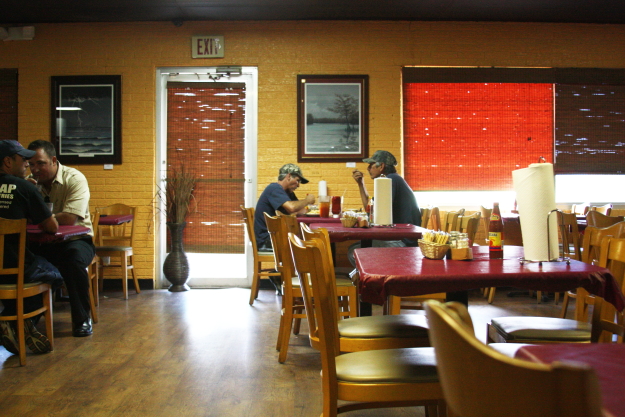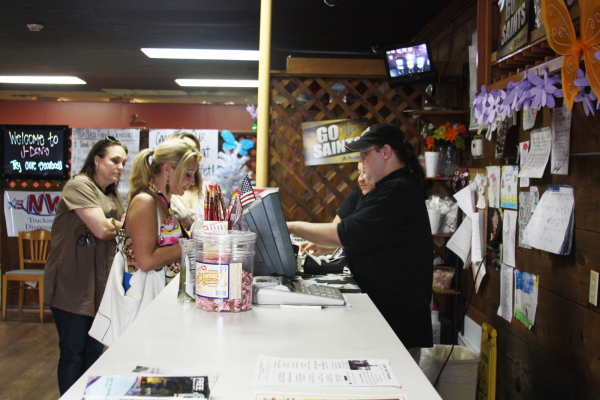 Restaurant people like me need to know who our customers are and what they want and must ensure that our restaurant delivers a high quality product (great tasting food, wonderful atmosphere, and generous service) in a timely fashion. But what makes some restaurants more successful than others is the ability to define and deliver on the unspoken (or hinted at) expectations of customers. A lot of restaurant leaders call this part of our job managing expectations, but really what that means is that we are in the business of reading customers’ minds.
Restaurant people like me need to know who our customers are and what they want and must ensure that our restaurant delivers a high quality product (great tasting food, wonderful atmosphere, and generous service) in a timely fashion. But what makes some restaurants more successful than others is the ability to define and deliver on the unspoken (or hinted at) expectations of customers. A lot of restaurant leaders call this part of our job managing expectations, but really what that means is that we are in the business of reading customers’ minds.
Customers may say they want a salad, but what they really desire is something much more complicated.
When I hear, “Don’t you have a simple salad with chicken?” I quickly run an internal algorythm (based on years of waiting tables and managing) that tells me what customers who typically ask this question want but don’t ask for. perhaps the customer really wants a simple green salad with the dressing on the side and a large portion of inexpensive, poached chicken put on top. The customer expects this salad to cost less than $12-14. The customer may like a smile from the waiter but may be opposed to any chit-chat. The customer may also be of the mindset that any white wine will do, so long as it comes in a big glass and costs less than $10. A customer who asks this question tends not to be adventurous and likes to stay in their comfort zone. Avoid selling specials to the guest, especially if there is an item on the dish that the customer has never heard of before (they will most likely hate the dish).
If you’re a simple salad with chicken person, just know that not everyone insists that every restaurant have chickens poaching in the back kitchen for moments such as this. I don’t mean this in an offensive way, I just mean to say that what your expectation is of a restaurant is much different than the I want a basket of bread and olive oil and balsamic vinegar customer, or the what’s the most popular thing on your menu person.
Expectations may seem like a clear goal that everyone should know, but the fact is, what we think most people should do is not a universal belief system. Expectations are just an individual’s strong personal belief that something specific will happen in the future. None of us know for sure what other people want, we just know what we expect and make guesses from there. Just ask any guy what women expect on a first and second date and you’ll get a whole range of answers. Because here’s the thing–unless the person holding the expectation speaks what they want aloud, no one will ever know for certain the exactitudes of their desires.
I like to joke that I’m honing my psychic powers while I work in restaurants, but honestly it’s true. That’s exactly what I’m doing. I’m constantly reading the energy and body language of my guests and gathering clues about what’s really going on below the surface.
What do you (really) want?
Let’s talk about general expectations people have of restaurants. For some people, hand picked heirloom tomatoes and small batch burrata mean more flavor. For other people, just the mention of the word heirloom sets their skin crawling and their BS meter on high alert. One guest may like hearing specials recited at their table while another customer may find that kind of thing obtrusive and verging on deceptive. Depending on the expectations, one restaurant could get a five star Yelp review for the same exact experience that garnered a one star review from another.
Getting clear on expectations
If you know what specifically makes you happy at a restaurant then it’s very easy to identify what rubs you the wrong way. Or what it looks like when something goes terribly wrong at your table. “Waiter, there is a fly in my soup,” you may say. Or perhaps you are compelled to call over a manager because your waiter seems to have forgotten you and your order. Regardless of what specifically the restaurant did to fail your expectations, how clearly you can express those shortcomings to the person offering to make the situation better will get you so much closer to a resolution.
Sometimes restaurant managers know how to do the right thing and are empowered to go and get it done. Sometimes they just don’t. In all my years in restaurants, I have seen plenty of mistakes happen. I do my best to sincerely apologize, offer a solution, and go a little bit farther for the guest to ensure I can turn the guest’s experience around.

You wouldn’t believe half the stuff I’ve done trying to win guests back. I apologize, stay away from excuses, take items of the check, and then do whatever I can to connect to the guest. Sometimes it works and sometimes it doesn’t. Along the way of managing expectations, I’ve seen miraculous things happen. In the process of being sincere and generous of spirit, I’ve seen smiles come from the unhappiest of people. I’ve gotten hugs of gratitude. I’ve even minted customers for life. But sometimes, no matter what I do or how much radical hospitality I give, I can not win back a guest. It’s as if that small mistake of a forgotten side dish or a loud song on the sound system were offensive acts perpetrated against these hurt individuals. It is as if I personally attacked them, when in reality all that happened was that someone pressed the wrong button in the computer or failed to get a dish to the table in a timely fashion.
But it doesn’t matter what happened when things go wrong. What matters most to you, the unhappy customer, is what is done to fix the situation. Right?
But what about you? What sort of responsibility does the customer hold? If you have high expectations but can not voice what it is you expect, or you can not accept any resolution that’s offered to you, do you hold any responsibility for your unhappiness?

I do not, in any way, mean to lessen the responsibility of the restaurant in the equation of making customers happy. No way. But what I am supposing is that in every hundred customers who have their expectations met, there are a small percentage of people who will never be happy with any business (or personal) exchange, no matter how hard the business tries to make things better. I mention this because I hope that I might some day one of these posts might help one person realize that if they can never find happiness in any business exchange, maybe it might be time to look at working on the one constant in the equation.
High Expectations of Service
But here’s the thing about expectations–we all have them. How we deal with our expectations and how willing we are to be flexible with what is given to us is an important piece in our long term happiness. If we don’t get exactly what we want, do we experience profound disappointment? If we find people are consistently letting us down do we get angry, sad, resentful, or spring into action to make a change in our priorities? Just how far are we willing to go to be happy? Are we willing to be open to new experiences? Or do we only want things our way?

